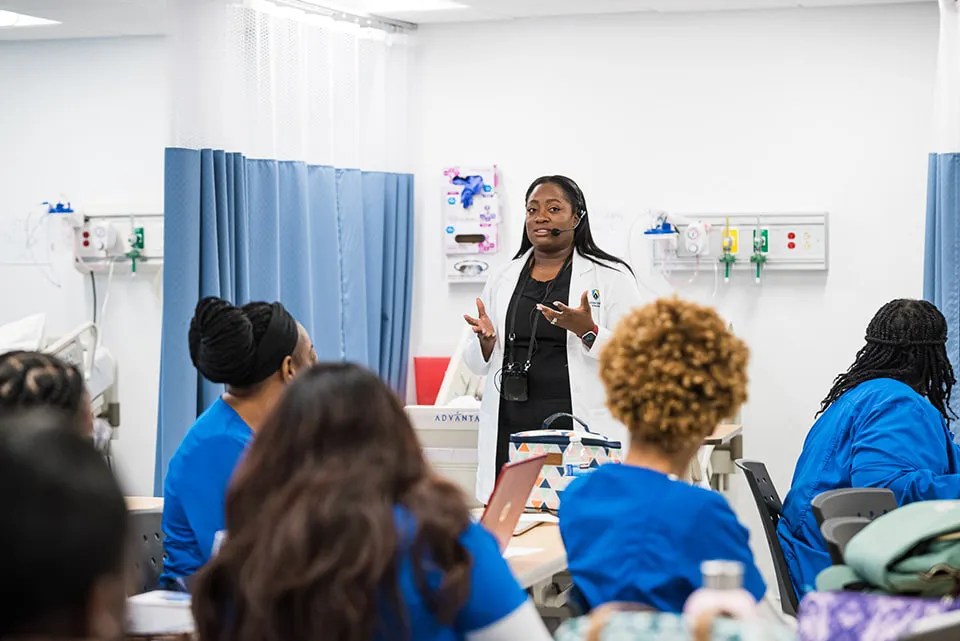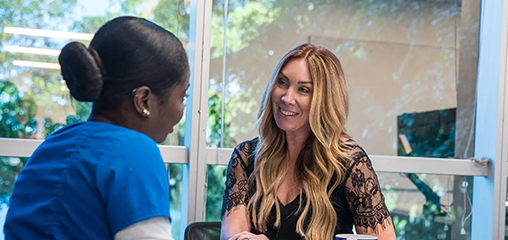
Clinicals are an essential part of any nursing program and, together with your classroom education, give you the framework to prepare for a successful nursing career. But what exactly are clinicals? What do they really entail? And specifically, how will clinicals help you to become a more effective registered nurse?
We’ll answer all these questions and more in this beginner’s guide to understanding clinicals. Let’s get started!
What Are Clinicals in Nursing School?
Clinicals are healthcare training experiences where nursing students will rotate through different practice settings while shadowing real-world nursing professionals. During the training, students will observe nurses as they go about their work and have a chance to ask questions. Later in clinicals, students may do hands-on work with patients while supervised by a registered nurse. Clinicals are required as part of all RN education programs, whether it’s an Associate Degree in Nursing (ADN) or Bachelor of Science in Nursing (BSN) degree.
Where Will Clinicals Occur?
Typical clinical settings where you can expect to gain experience are hospitals, long-term care/nursing homes, and other outpatient or community settings. Common specialties in clinicals include geriatrics (older adults), acute care, pediatrics (children and infants), labor and delivery, mental health, pre- and post-surgery, and emergency care. Where you are placed for clinicals will be determined by your geographic location, availability of preceptors (this is the name for nurses who will supervise your clinical), and clinical locations where you can learn and gain the appropriate skills before graduation.
What Exactly Happens at Clinicals?
A typical day in clinical will involve observing patient care under a practicing nurse’s guidance. Students will be able to ask questions of the nurses they shadow. Later, students may be actively involved in performing patient care.
 You will be assigned to the same patients as the attending nurse and be responsible for understanding their care needs and familiarizing yourself with their medications and orders. The amount of independence you are given in caring for patients will increase as you progress through clinicals. Different rules in each state and practice setting determine what tasks nursing students can and cannot perform. Your clinical instructor and precepting nurse will instruct you on appropriate tasks and help develop your skills.
You will be assigned to the same patients as the attending nurse and be responsible for understanding their care needs and familiarizing yourself with their medications and orders. The amount of independence you are given in caring for patients will increase as you progress through clinicals. Different rules in each state and practice setting determine what tasks nursing students can and cannot perform. Your clinical instructor and precepting nurse will instruct you on appropriate tasks and help develop your skills.
Clinicals allow you to use the education and skills learned in the classroom. You begin to build your confidence and gain valuable insight into what a typical day for a nurse may look like. You will also use this time to help decide what type of nursing you want to pursue. Many nursing students will have the chance to select a final clinical rotation in a chosen specialty area.
Skills You Can Expect to Learn During Clinicals
There are certain skills employers will expect you to have mastered when hired as an RN. These foundational skills will enable you to perform core functions of the role. Many of these base skills will be covered during the clinical training:
- Reviewing patient information and creating a nursing care plan
- Taking vitals and recognizing normal and abnormal readings
- Completing a head-to-toe assessment
- Administration and documentation of medications
- Electronic medical record use
- Patient care tasks such as safe patient handling (moving and positioning) and activities of daily living (ADLs). ADLs include eating/feeding, dressing, grooming, toileting, and mobility.
Based on your rotation, you may also gain experience with wound care, IV (intravenous) medications, injections, immunizations, inserting/removing urinary catheters, and other procedures.
Why Are Clinicals Important for Nursing Education?
Completing required courses and learning the foundations of nursing practice in a classroom will only take you so far. Clinicals give you real-life, direct patient care experience. It’s the place where your classroom knowledge can be applied in the real world. Clinicals get you comfortable with utilizing the skills and knowledge you’ll need to be a successful registered nurse.
Clinicals are an important part of your nursing education. While the number of hours and specific guidelines will vary based on the state where you live and the program requirements, every nursing student must complete clinicals before graduating. Without clinicals, you would not be prepared to practice nursing and treat patients.
What Does the Clinical Process Involve?
The clinical process is a partnership between you, the school of nursing, and the clinical setting where you are placed. Generally, there will be a coordinator in your program who helps with communication and supervision. This can be a clinical instructor or other faculty member. Students begin their clinicals after completing general education and nursing courses. You will shadow and work directly with a practicing nurse.
Occasionally, you will have the chance to work with or observe other healthcare professionals such as nursing assistants, aides, or doctors. This is helpful since you will work closely with other professionals during your career.
The clinical process is typically broken up into separate rotations. Each rotation will be a specified number of hours. You will work with your clinical instructor to determine the schedule of when your hours occur. As your different clinical rotations progress, the goal is to gain and master new skills. You will receive feedback from your clinical instructor throughout the process.
 You can expect to have several different rotations to ensure you gain experience with different patient populations. These will sometimes align with specific classes you are taking. For example, when taking a class about medical-surgical nursing, you may have a clinical on what is called a “med surge” floor in the hospital. When you take a class focused on community health, you may have a clinical in an outpatient setting such as a health clinic, senior center, or WIC (women, infant, and children) office. The actual clinical schedule will vary depending upon your nursing program and the healthcare facility hosting the clinical training. Clinicals can occur in any setting where nurses practice, and a qualified instructor is available.
You can expect to have several different rotations to ensure you gain experience with different patient populations. These will sometimes align with specific classes you are taking. For example, when taking a class about medical-surgical nursing, you may have a clinical on what is called a “med surge” floor in the hospital. When you take a class focused on community health, you may have a clinical in an outpatient setting such as a health clinic, senior center, or WIC (women, infant, and children) office. The actual clinical schedule will vary depending upon your nursing program and the healthcare facility hosting the clinical training. Clinicals can occur in any setting where nurses practice, and a qualified instructor is available.
Nursing schools have relationships with local community partners and will ensure you are placed and that you complete the required number of clinical hours. Completing clinical rotations can help you build relationships with potential future employers. Once enrolled in a nursing program, you will receive specific information about clinical partners and locations.
At the end of each clinical, you will have an evaluation or grading. This is to ensure you are meeting the requirements to progress towards graduation.
While this may sound scary, it is an excellent opportunity to gather feedback and gain confidence. Clinicals are designed to increase your independence as you go, so after completing each rotation, you will be closer to becoming a fully trained registered nurse.
Tips To Be Successful in Clinical Rotation
Now that we have discussed what clinicals are in nursing school, let’s review some tips to help you be successful in your clinical program. These tips can help you to get the most out of your clinical experience:
- Never Be Afraid to Ask Questions: You remember the old phrase, there is never a bad question? This holds true when you’re learning to become a registered nurse. It can feel challenging to ask questions, but it is also how you learn. Each practice setting and role can vary greatly, and you won’t be expected to know everything right away. You can always write down your questions throughout the day and ask them later.
- Utilize Your Clinical Instructor: Clinical instructors have a wealth of knowledge. They spent time as practicing nurses and have years of experience working with nursing students. They are a great option when you have additional questions or are unsure about something you may have observed or experienced.
- Advocate For Unique Opportunities: Nurses are known for being patient advocates, but we can also use those same skills to help ourselves. Speaking up and letting your clinical instructor know you are looking for unique opportunities can help you gain valuable experience. There are times when nursing students may be invited to observe surgery, attend an interdisciplinary (this is a term for a group of health care professionals who work together) meeting, or even be present for an emergency code (these are typically called when a patient stops breathing or their heart is not beating).
- Practice The Basics: It may seem boring, but practicing basic nursing skills will help you feel more confident when starting your first job. For example, practice taking patient vitals manually, without using automatic machines for blood pressure and heart rate. It is more time-consuming but ensures you are confident in your skills. Sometimes machines break, or if you choose to work outside the hospital, you won’t always have access to this equipment.
- Commit Time to Your Own Mental Health: Clinicals in nursing school can bring feelings of excitement but can also make you feel nervous and increase stress. It is important to know that most nursing students have these feelings, and it can be a normal part of the learning process. Take time to process your experiences and reach out to other students, your clinical instructor, or other faculty members for mental health support whenever needed.
Clinicals are a hallmark experience in your nursing education and solidify the knowledge gained in the classroom and simulation settings. Working in these dynamic, interdisciplinary settings will help you gain confidence in yourself and your ability to care for others. Clinicals help lay the foundation for your nursing career and even help you decide what area of nursing you want to specialize in. Use this time wisely, as it is just the beginning of your exciting journey towards becoming a nurse.
Start Your Future in Nursing Today

If you’re considering a career as a registered nurse (RN), Arizona College of Nursing is here to help you pursue your dream. Our BSN program enables you to earn a Bachelor of Science in Nursing in just 3 years or less with qualifying transfer credits. We’ve helped hundreds of students to earn a BSN degree and enter the nursing profession – and we’re ready to support you on your path to becoming an RN.
Why Choose Arizona College of Nursing?
- Earn a BSN degree in 3 years or less with eligible transfer credits
- Campus locations throughout the US
- Night classes for general education courses
- Hybrid Online/In-Person format for general education classes
- Nursing education is all we do
- CCNE-Accredited Program*
- NCLEX-RN success coaches and exam preparation class
- Financial aid available to those who qualify
Discover Your Path to a Career in Nursing
Information in this post is accurate as of June 26, 2024.
*The Bachelor of Science in Nursing (BSN) degree program at Arizona College of Nursing is accredited by the Commission on Collegiate Nursing Education (https://www.aacnnursing.org/). All Arizona College of Nursing and Arizona College campuses are institutionally accredited by the Accrediting Bureau of Health Education Schools (https://www.abhes.org/), a U.S. Department of Education-recognized accrediting agency.








